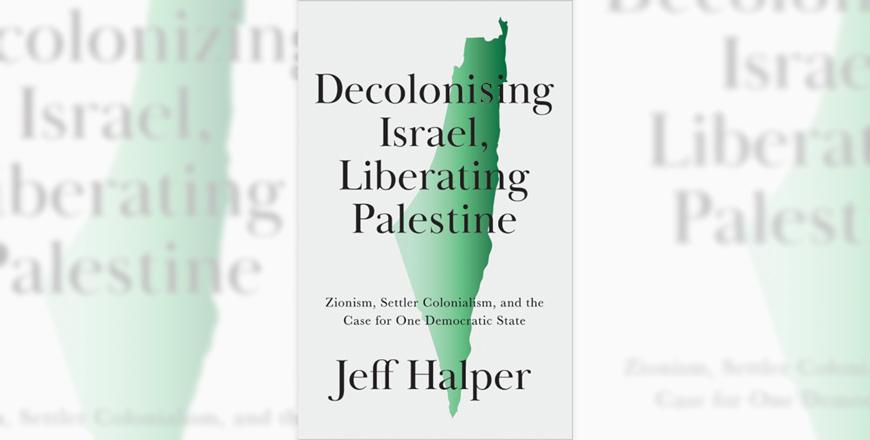- Mix
- Tue-2021-04-20 | 05:44 pm

Nayrouz News Agency :
Decolonising Israel, Liberating Palestine: Zionism, Settler Colonialism, and the Case for One Democratic State
Jeff Halper
London: Pluto Press, 2021
Pp. 244
Trained as an anthropologist, the author of this book, Jeff Halper, is an anti-Zionist Israeli Jew who self-identifies as a "coloniser-who-refuses”, a phrase adopted from Tunisian Jew Albert Memmi. Having been involved in joint work with Palestinians for decades, chiefly via the Israeli Committee Against House Demolitions, which actively resists demolitions as well as helping to rebuild Palestinian homes, he has published extensively on the nature of the Israeli state.
His political analysis led him to be a co-founder of the One Democratic State Campaign which groups Palestinian and Jewish intellectuals seeking to go beyond critique to outline not only a vision, but also a plan whereby the two sides can work together to replace the current status quo with a new polity in historical Palestine, based on justice and equality. A basic premise of his argument — and urgency — is the growing awareness, even among liberal Jews, that the two-state solution is "now dead and gone, buried under massive settlement blocs. We must move on”. (p. 195)
Another basic premise is that Israel has de facto established a single entity, an apartheid regime, throughout the land, while the majority of Israel Jews remain unconcerned, taking the occupation of the West Bank and Gaza Strip for granted. Meanwhile, the official Palestinian leadership remains bogged down in the mentality of the post-Oslo, two-state negotiations. In Halper’s view, these negotiations can never lead anywhere (and, on Israel’s part, were never intended to). Though promoted as conflict resolution, they have never been more than conflict management. A total paradigm shift is called for, starting with a return to the concept of Israel as a colonial-settler state, thus the need for decolonisation, which was part of the original programme of both the PLO and the Israeli left.
The book is divided into three main parts: Zionism as settler colonial project; Three cycles of Zionist colonial development; and Decolonising Zionism, Liberating Palestine.
The first two parts deliver a comprehensive, incisive analysis of the Israeli state and how it has created today’s apartheid reality, with useful references to the works of other scholars who have analysed Israel and other colonial projects. To Halper, analysis matters: It is necessary to know how settler colonialism works if only to dismantle it.
Part 3 is the most ground-breaking and downright tantalising to anyone, Palestinian, Israeli or otherwise, who is seriously interested in a real, viable solution. Engaging in decolonisation entails reframing the issues in such a way that both Palestinians and Israeli Jews can envision their role and advantage in joining this process. Halper begins by reviewing the Palestinians’ resistance, emphasising that it has been a constant throughout Zionism’s colonisation of their homeland. The problem lies in the lack a political programme or the inadequacy thereof — a gap which the book sets out to address. But Palestinians must also acquire what Halper terms summoning power, roughly equivalent to mobilising outside factors. As he points out, international law (UN resolutions and the Geneva Conventions) is not enforceable without the backup of powerful states. On the other hand, mobilising international civil society around a political programme is the most effective form of summoning power, as was shown by the ANC’s success in defeating apartheid in South Africa. Eventually, this international movement will impact on governments without whose backing Israel cannot continue. This, in turn, will impact on the position of Israeli Jews. Even now, "Israel’s panic over the BDS campaign demonstrates that it has already lost in the Court of Public Opinion”. (p. 171)
The book outlines the required steps for decolonisation. A reconciliation process would begin wherein Israeli Jews would acknowledge past colonial crimes and recognise the Palestinian right of return. Thereafter, they would be accepted as citizens in the new democratic state. Enabling the return of all those made refugees since 1948 is an imperative, as is holding Zionism accountable and instituting redress for colonial injustices. All colonial structures must be dismantled, such as the regimes for control of population, land and the economy, to allow for equal access to land and economic opportunity. The entire security system must be dismantled or reframed.
At present, there is a need for establishing preliminary principles which Palestinians and Israeli Jews can agree on despite conflicting worldviews. Via joint struggle for decolonisation, a shared vision of the future will develop on "constructing a new political polity based on universal citizenship, equal rights, democracy and pluralism” and offering settlers a new role in a new community. (p. 135)
Halper discusses all these issues in detail and many more, frankly dealing with obstacles and unresolved questions, including the fears both Palestinians and Israeli Jews may have about entering such a process. He doesn’t pretend that creating one democratic state will be easy but he contends that it is the only way for Palestinians and Israelis to gain long-term security and a viable way of life.
-
 Will Trump end up like Kennedy?2026-02-03
Will Trump end up like Kennedy?2026-02-03








